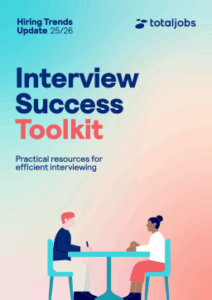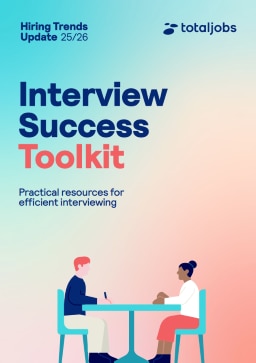
30 interview questions for successful hiring
Table of Contents
- Introductory questions
- Competency-based questions
- Advanced questions
- Best practice for interviews

Interview Success Toolkit
You’ve written a job advert and drawn up a shortlist of candidates. Now it’s time to conduct the interview process to uncover the most suitable candidate.
In this article, we’ll look at 30 questions to ask in an interview to navigate the complexities of assessing prospective employees and identify the ideal candidate.
Introductory questions

These questions serve as a foundation for understanding candidates’ backgrounds, motivations, and suitability for the role. A good interview will often start with these simpler questions, before moving on to more taxing ones.
“Tell me about yourself…”
This open-ended question allows candidates to provide an overview of their background, work experience, and career aspirations. Furthermore, this question offers candidates the chance to show their ability to articulate relevant details concisely and highlight key achievements.
“What do you enjoy outside of work?”
Understanding a candidate’s interests and hobbies can provide insights into their personality and potential cultural fit within your team. It also helps build rapport and establish a more well-rounded view of the candidate.
“Walk me through your CV…”
Ask candidates to explain their CV in detail, emphasising work history, education, and notable achievements. This will allow you to assess their ability to communicate effectively and present a coherent career narrative.
“Tell me about your current job…”
Gain insights into candidates’ current role, responsibilities, accomplishments and relationship with their previous employer. Look for specific examples that demonstrate their skills and alignment with the type of work they would do in the position you’re hiring for.
“Why do you want the job?”
Assess what made a candidate apply for this position and if their motivations align with your values, mission, and culture. Try and establish if the candidate has genuine enthusiasm and a clear understanding of the role’s responsibilities outlined in the job description.
“Describe your ideal work environment…”
This question allows you to assess a candidate’s preferences and their compatibility with your culture. Be on the lookout for indications of their desired level of autonomy, collaboration, and the working conditions that bring out their best performance.
“How do you stay organised/manage your workload?”
Understanding how candidates handle time management and prioritisation is important, particularly if the role involves project management or working to tight deadlines. You can use this question to see if the candidate can provide effective strategies and systems they use to stay organised and meet deadlines.
“What are your salary expectations?”
Discussing salary expectations helps ensure alignment between the candidate’s expectations and your salary benchmarking. It also allows you to gauge their understanding of market rates and whether their expectations align with the role’s responsibilities and requirements.
“Where do you see yourself in five years’ time?”
Inquiring about candidates’ five-year goals allows employers to better understand their ambitions, commitment to the company, and alignment with growth opportunities. This helps assess the potential for advancement and a mutual long-term partnership.
“Do you have any questions for me?”
Encourage candidates to ask questions to assess their engagement and interest in the position and the company. Look for thoughtful inquiries that demonstrate genuine curiosity and that they have taken the time to do their own research.
Competency-based questions

Competency-based interview questions form the heart of many an organisation’s skills-based hiring strategy. This is because they not only dig into a candidate’s soft skills and previous achievements and challenges, but when done properly they offer one of the surest ways to reduce bias in the interview process.
Usually framed as “tell me about a time when…”, or “give an example of…” these questions should be scored objectively. They serve as behavioural interview questions too, because they are all about how a candidate has acted in the past.
“Tell me about a time you had to give difficult feedback…”
Assess a candidate’s emotional intelligence and delve deeper into their soft skills. This will allow you to learn more about their ability to provide constructive criticism and their approach to maintaining positive relationships in challenging situations.
“Give me an example of a time when you had to think or react quickly in response to a delicate situation…”
Evaluate a candidate’s ability to handle high-pressure situations using tact and diplomacy. Use this question to assess a candidate’s thought process, their critical thinking skills, and the outcomes they have achieved while navigating delicate situations.
“Give an example of a time when you had to adapt to change in the workplace…”
Evaluate a candidate’s adaptability and flexibility, which are essential qualities in a dynamic work environment. Look for specific examples of how they have embraced change and achieved successful outcomes.
“Tell me about a difficult work situation and how you overcame it…”
Evaluate a candidate’s problem-solving skills and their ability to navigate challenges. See if the candidate can provide specific examples, outline their thought processes, and the outcomes they achieved in difficult situations.
“Describe a time you fell behind schedule. What went wrong, and what would you do differently next time?”
Understand a candidate’s ability to reflect on past experiences, take accountability, and learn from mistakes. Look for their proactive approach to improving their time management, work ethic, and overcoming obstacles.
“Tell me about a time you’ve turned a negative into a positive”
Evaluate a candidate’s resilience and their problem-solving skills in challenging situations. This will allow you to assess their ability to find opportunities for growth and success despite suffering setbacks.
“Do you work best alone or as part of a team?”
Understand a candidate’s preferred working style and their ability to collaborate effectively with other team members. Look for indications of their ability to contribute to team dynamics and work well with others.
Advanced

For candidates who have proven their mettle and are becoming potential employees, these questions explore how they handle delicate situations and demonstrate both resilience and leadership skills.
“Why are you leaving your current job?”
Explore the candidate’s reasons for seeking new opportunities and professional development goals. Lookout for responses that indicate ambition for career growth, enthusiasm for new challenges, or alignment with your company’s values.
“If you’re successful, what do you think would be most challenging in this role?”
This question is used to assess a candidate’s awareness of the biggest challenges they may face and their ability to address them, allowing you to explore their ability to think critically and provide an honest opinion of their expectations for the role.
“What does the ideal workday look like to you?”
Assess a candidate’s work-life balance priorities and their expectations for a fulfilling workday. Look for indications of their desired level of challenge and autonomy following their initial onboarding.
“What are your strengths?”
Use this question to invite candidates to discuss what they view as their key strengths and how they relate to the position. Look for a combination of technical skills and soft/transferable skills, such as communication, leadership, problem-solving, and adaptability.
“What are your weaknesses?”
Evaluate a candidate’s self-awareness and their ability to reflect on areas for improvement. You’ll want to see candidates demonstrating honesty, willingness to learn, and highlighting examples of how they have actively worked on addressing their own perceived weaknesses.
“What do you know about our organisation?”
Assess a candidate’s research and knowledge about your company. Look for indications that they have taken the time to understand your industry, mission, values, and recent achievements ahead of the interview.
“Where does this job fit into your career path?”
Understand a candidate’s long-term career goals and how this position aligns with their aspirations. Explore if candidates see the role as a stepping stone towards their professional development and where it fits into their long-term goals.
“How do you deal with tight deadlines?”
Assess a candidate’s time management and prioritisation skills. This will help you learn more about the candidate’s strategies in managing competing tasks and their ability to remain calm and focused under pressure.
“How do you deal with failure?”
Understand a candidate’s mindset and coping mechanisms when faced with professional failures or setbacks. Listen out for answers that demonstrate a candidate’s ability to learn from their own mistakes, take responsibility, and bounce back stronger.
“How do you determine or evaluate success?”
Evaluate a candidate’s perspective on success and their ability to set and achieve goals for themselves. This is a great question as it provides an opportunity for candidates to highlight their drive, self-motivation, and alignment with your company’s values.
“What motivates you to work?”
Use this question to gain insight into a candidate’s sources of motivation and their alignment with the job and your company. This will help you better understand their passion, purpose, and the desire to make a meaningful impact.
“When conflict arises at work, how do you handle it?”
Assess a candidate’s conflict resolution skills and their ability to maintain positive working relationships. Here you’ll want to see candidates demonstrating an approach to resolving conflicts with empathy, collaboration, and communication.
“Describe a time when you had to work with a colleague you didn’t get along with…”
Assess a candidate’s interpersonal skills and their ability to work effectively amidst challenging team dynamics. Here you’ll want candidates to demonstrate their ability to manage conflicts, find common ground, and collaborate towards shared goals.
Best practice for interviews

Be prepared for common questions from interviewees
Be prepared for candidates to ask questions about company culture, team dynamics, growth opportunities, role responsibilities, and the next stage of the recruitment process.
Avoid certain questions or topics of conversation
Avoid questions related to age, gender, marital status, religion, etc., to ensure fair and compliant interviewing practices that help to reduce bias.
Structure the interview carefully
Start the interview with introductions and specific questions about candidates’ skills and experiences, then provide an opportunity for candidates to ask their own questions.
Take notes, but don’t lose focus on the candidate
Jot down key details about the candidate’s background, qualifications, and responses. Note strengths, weaknesses, and standout qualities and use your notes as references for follow-up questions. Taking notes is important but don’t let it take your focus off of the interviewee.
Ask follow up questions
Use follow-up questions to gain deeper insights into candidates’ experiences, skills, and problem-solving abilities. Active listening and relevant follow-ups foster meaningful conversations, leading to more comprehensive assessments and well-informed hiring decisions.
End the interview professionally
Express gratitude, summarise the discussion, and manage expectations for the next steps to leave a positive impression and ensure a positive candidate experience.
Recruiter’s FAQs
How do I decide which of the 30 questions to use for a specific role?
Start by mapping your role’s core competencies and level of seniority. Use introductory questions to gauge cultural fit and communication skills for all roles. Layer in competency-based (“Tell me about a time…”) questions to probe critical soft skills (e.g. leadership, adaptability) for mid-level positions. Reserve advanced questions—on strategy, challenge awareness, career aspirations—for senior or highly specialised hires.
What’s the ideal number and mix of questions for a 45–60?minute interview?
Aim for 8–12 focused questions:
- 1 open slot for candidate’s own questions (this keeps the conversation balanced and leaves time for follow-ups.)
- 2–3 introductory (e.g. “Walk me through your CV”)
- 4–5 competency?based (aligned to key skills)
- 1–2 advanced for depth (for senior roles)
How can I objectively score candidates’ answers?
Use a STAR-based rubric (Situation, Task, Action, Result) for each competency question. Assign a simple numeric scale (e.g. 1–5) for:
- Relevance of example
- Clarity of their process
- Outcome and learnings
What best practices ensure a fair, compliant, and engaging interview?
- Structure consistently: Same question set for all candidates for the role.
- Avoid disallowed topics: Age, marital status, religion, etc.
- Take focused notes: Capture key points without losing eye contact.
- Encourage candidate questions: Signals engagement and clarifies expectations.
- Close professionally: Summarise next steps and thank them—leaving a positive impression.
Explore articles
Receive the latest recruitment resources and
advice to boost your hiring
By providing us with your details you agree to our privacy policy and for us to keep you updated with the latest news, events,
and special offers from Totaljobs.







